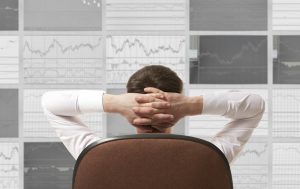 Today, all you need to get started trading in the market is a reliable internet connection and a hunger to succeed. Is it possible to open your laptop each day and sustain a living this way? The truth is that you can not only survive but thrive – however, it is important to keep in mind that this job has its challenges like any other. You can do it from your home office or armchair, but that doesn’t mean you’ll be working any less hard than you do in your office job. The biggest myth to debunk is that being a day trader is passively “easy” – it takes discipline, education and commitment.
Today, all you need to get started trading in the market is a reliable internet connection and a hunger to succeed. Is it possible to open your laptop each day and sustain a living this way? The truth is that you can not only survive but thrive – however, it is important to keep in mind that this job has its challenges like any other. You can do it from your home office or armchair, but that doesn’t mean you’ll be working any less hard than you do in your office job. The biggest myth to debunk is that being a day trader is passively “easy” – it takes discipline, education and commitment.
What do people trade in?
You are not limited to stocks. Once you have mastered trading shares, you could, for example, trade forex, futures and options and learn how to trade CFDs. Commodities and gold are other options, as is cryptocurrency. There are plenty of opportunities to explore.
The pros and cons of being a day trader
Now that you know that there are benefits as well as challenges, let’s examine both sides of the coin. When it comes to the advantages, you are your own boss, you can work from the comfort of your home if you choose, and the hours you work are up to you because at any point in time, there is always a market to trade open somewhere. Your overheads are mostly confined to your laptop and internet connection, which is another plus – no more boring commutes or transport costs.
On the other hand, it is a solitary exercise if you’re not with other day traders in an office, so make sure you are psychologically suited to this. You also have to constantly evolve and up your game as robots, algorithms and auto systems now account for 60% of all trade. It’s hard to see how humans would ever be rendered redundant in trading, but you have to be sharp about how you go about it.
Another challenging factor is that your salary can be erratic. You might make a significant profit only to sustain an equally drastic loss the next day. You also need to consider your future. What will you do if this does not work out? Will you have new skills you can bring to the corporate market? This means constantly educating yourself.
Where you live and the applicable taxes will also have an impact on your chances of day trading success.
Important things to bear in mind when starting
Your setup is important, and this includes your choice of broker. Conduct thorough research to make sure it suits your needs. Plan, and put some trading strategies in place. This means committing to ongoing education via your broker’s news, forex advice and analysis, podcasts, independent insights, webinars and more.
On the capital front, you’ll need at least $1,000 to start with. This is what it takes to open most accounts and enter a few trading positions while still having cash in reserve. Your risk analysis is important. You need to know how much you are willing to risk in each instance, and stick to that or risk being wiped out. It is always a good idea to put a stop loss mechanism in place.
Perhaps the single most important factor is how disciplined and psychologically resilient you are. The trader who tells you they never faced a series of small but steady crises or at least one near wipe-out is selling you fantasies and setting you up for a crash landing back to reality. To stay both sane and focused, veteran traders often say that the goal is to focus on the trade, not the money.
In the last five years, the number of day traders worldwide has surged. This is because it is a tough but exhilarating way to make a living. The trick is knowing what you’re in for, being thoroughly prepared, and being willing to go the distance.